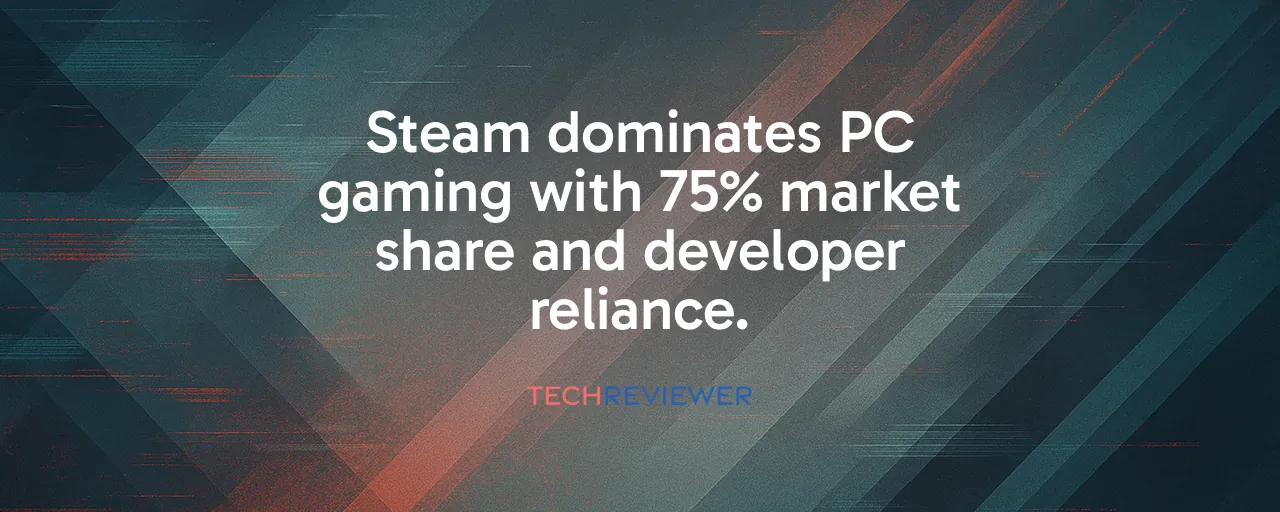Steam's Unrivaled Hold on PC Gaming
Steam's dominance in PC gaming is hard to miss. With a 74-75% share of the digital distribution market, Valve's platform has become the go-to hub for millions of players and developers alike. A 2025 survey of 306 gaming executives from the US and UK, conducted by Atomik Research for Rokky, revealed that 88% of developers rely on Steam for at least three-quarters of their revenue, with 37% pegging it at 90%. That kind of market control sparks heated conversations. Developers appreciate Steam's reach, but many worry about leaning so heavily on one platform.
The Dependency Trap
For many developers, Steam is both a lifeline and a source of unease. The platform's 30% revenue cut, while standard for digital storefronts, stings when compared to Epic Games Store's 12% fee or its new zero-percent cut on the first $1 million in annual sales. Over half of surveyed developers expressed concern about their reliance on Steam, fearing that a single algorithm tweak or policy shift could tank their visibility. Take TCG Card Shop Simulator, a solo project from Malaysia's OPNeon that sold 1 million copies in its first month on Steam. Its global success highlights Steam's unmatched reach, but also underscores the risk of depending on one marketplace for such a massive share of income.
Navigating a Crowded Market
The PC gaming market is bursting at the seams. In 2024, Steam saw over 18,000 new titles flood its storefront, creating a discoverability nightmare for 33% of developers surveyed. With so many games vying for attention, standing out is tougher than ever. Free-to-play giants like Fortnite, projected to rake in $6 billion in 2025, and Roblox, with 380 million monthly users, dominate player time, making it harder for paid titles to compete. Developers also pointed to subscription services like Xbox Game Pass, which raised its price to $29.99, as a growing concern, potentially devaluing individual game sales.
Indie Success and Global Reach
Steam's scale can be a game-changer for small studios. Consider Until Then, a Filipino-inspired visual novel by Polychroma Games that drew 92% of its sales from outside the Philippines. Steam's global infrastructure, supporting 29 languages and regional pricing, made that possible. Its recommendation algorithms and Discovery Queue help niche titles find their audience, yet developers still struggle against the tide of new releases. The platform's Steamworks toolkit, offering APIs, cloud saves, and community features, empowers creators, but the sheer volume of games means even great titles can slip through the cracks.
The Monopoly Question
Does Steam's dominance make it a monopoly? The survey found 72% of developers think so, but industry analyst Mat Piscatella from Circana argues they're missing the legal mark. A monopoly requires more than market share; it demands proof of anticompetitive behavior. The ongoing Wolfire versus Valve lawsuit claims Steam's pricing policies, like its Most Favored Nation clause, stifle competition by preventing lower prices elsewhere. Valve counters that its 30% cut reflects the value of its robust features, from cloud saves to the Community Market. Meanwhile, competitors like Epic Games Store, with 295 million accounts, and GOG's DRM-free model offer alternatives, but none match Steam's user base or ecosystem.
Looking Ahead
The road forward for developers involves balancing Steam's benefits with diversification. About 80% of surveyed executives plan to explore other platforms like Epic or Microsoft Store within five years. Free-to-play models and subscription services will keep evolving, potentially blending ownership and access to keep players hooked. Regulatory scrutiny, like the Wolfire lawsuit, could force changes in Steam's policies, but its network effects and feature depth make it a tough giant to topple. For now, developers face a tricky reality: Steam's dominance is both their biggest opportunity and their toughest challenge.
